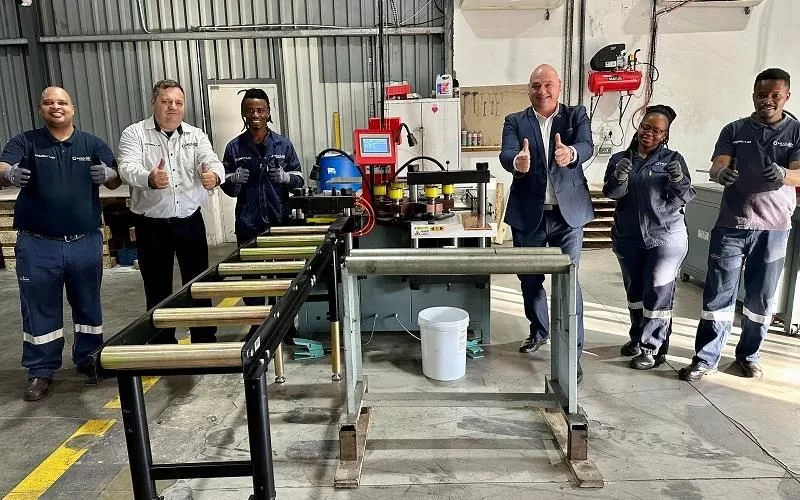South Africa’s upcoming general election is facing a crisis of existence for the African National Congress (ANC) as public dissatisfaction risks disrupting its uninterrupted majority rule. Unemployment, xenophobia, corruption, infrastructure problems, and crime are the major issues affecting the country. The election will serve as an indicator of the dreams, ambitions, and worries of a country positioned at a socio-economic and political junction.
What are the main issues facing South Africa’s impending elections?
South Africa’s upcoming general election is facing a crisis of existence for the African National Congress (ANC) as public dissatisfaction risks disrupting its uninterrupted majority rule. Unemployment, xenophobia, corruption, infrastructure problems, and crime are the major issues affecting the country. The election will serve as an indicator of the dreams, ambitions, and worries of a country positioned at a socio-economic and political junction.
As South Africa’s political landscape becomes increasingly convoluted, May 29 emerges as a significant date. The country is preparing for its most competitive general election in 30 years. The African National Congress (ANC), a symbol of authority, is facing a crisis of existence, as growing public dissatisfaction risks disrupting its uninterrupted majority rule.
The Complexities of the Electoral Battleground
The electoral arena is riddled with intricate issues, each reflecting the social and economic circumstances of the country. Five critical elements offer a detailed insight into the problems South Africa is wrestling with as it prepares to vote for a new National Assembly. This assembly’s members will subsequently elect the President.
Unemployment Crisis and Xenophobia
Unemployment is alarmingly high in South Africa, a country recognized as the continent’s most industrialized economy. South Africa struggles with one of the highest unemployment rates worldwide, despite its economic strength. The jobless rate among its 62 million citizens stands at a third, a number that has alarmingly soared since the ANC came into power. The stagnation of the economy over the previous decade has exacerbated this issue, with the younger generation, affectionately known as “born frees”, suffering the most from unemployment.
Closely tied to this unemployment crisis is the surge in anti-immigrant feelings. South Africa’s restricted job market attracts a wave of economic migrants from all over Africa. With 2.4 million documented foreign nationals, xenophobia has become a powerful weapon in political campaigns. Incidents of violence against immigrants sporadically erupting in 2008, 2015, 2016, and 2019 illustrate the severity of this latent hostility. Forecasts of future deportations have only fueled this aggression after the government recently ratified changes to immigration laws.
Corruption and Political Image
Corruption is a pervasive cancer gnawing at the political integrity of South Africa and is a major concern for voters. The ANC, once respected, is now perceived by many as a hub of corruption. The dwindling party membership, together with corruption scandals involving key ANC figures, has marred its reputation. In spite of President Cyril Ramaphosa’s promise to herald a “new dawn” to clear his predecessor Jacob Zuma’s corruption-ridden administration’s shadow, his personal integrity has been questioned. A current police inquiry into accusations of hidden theft of foreign currency from his farm in 2022 has further undermined public confidence.
Infrastructure and Crime Concerns
South Africa’s infrastructure problems, especially its long-lasting electricity crisis, contribute another dimension to the country’s challenges. Eskom, the national power company, struggles under its debt, incapable of supplying adequate electricity. The power outages that started fifteen years ago have worsened, leaving customers without electricity for up to half a day. However, the power interruptions ended in March, leading to doubts that the solution was a temporary tactic to win favor before the election. Despite being one of the world’s largest polluters, the country’s electoral campaign is conspicuously devoid of any substantial discussion on environmental matters.
Crime continues to be a pressing issue in a country dealing with a frighteningly high crime rate. The last three months of the prior year recorded an average of 84 murders each day. With a rape incident reported every eleven minutes, rampant crime constitutes a formidable challenge. Despite pledges from authorities to tackle this menace, police figures indicate a consistent rise.
The High Stakes of the Election
As South Africa approaches its elections, the stakes are immense. The election is more than a political competition. Instead, it serves as an indicator of the dreams, ambitions, and worries of a country positioned at a socio-economic and political junction.
What is at stake for the African National Congress (ANC) in South Africa’s impending elections?
The African National Congress (ANC) is facing a crisis of existence in the upcoming general election, risking its uninterrupted majority rule due to growing public dissatisfaction. The party’s reputation has been marred by corruption scandals, and its dwindling membership is a cause for concern. The election’s outcome will determine the party’s future and its ability to maintain its grip on power.
What role does unemployment play in South Africa’s upcoming elections?
Unemployment is a significant issue in South Africa, with one of the highest rates worldwide, particularly affecting the younger generation. The current economic stagnation has exacerbated this issue, and it has become a central theme in political campaigns. The surge in anti-immigrant feelings is also closely tied to the unemployment crisis, with migrants competing for limited job opportunities.
How does corruption impact South Africa’s political landscape?
Corruption is a pervasive issue in South Africa, and the African National Congress (ANC) has been implicated in several corruption scandals. The party’s reputation has been tarnished, and President Cyril Ramaphosa’s personal integrity has been called into question. Corruption remains a significant concern for voters, and the election’s outcome may indicate whether voters are willing to overlook the ANC’s history of corruption.
What infrastructure problems does South Africa face, and how do they affect the upcoming elections?
South Africa’s electricity crisis, which has lasted for fifteen years, has worsened in recent times, with power outages leaving customers without electricity for up to half a day. The national power company, Eskom, is struggling under its debt and is incapable of supplying adequate electricity. The country’s infrastructure problems, particularly the electricity crisis, contribute another dimension to the country’s challenges and may impact the election’s outcome.
What role does crime play in South Africa’s upcoming elections?
Crime is a pressing issue in South Africa, with a high crime rate and consistent rises in police figures. The country is dealing with a frighteningly high murder rate, with an average of 84 murders reported each day in the last three months of the prior year. With a rape incident reported every eleven minutes, crime is a significant concern for voters and may impact their decision in the upcoming elections.
What does the upcoming election indicate for South Africa’s socio-economic and political landscape?
The upcoming election serves as an indicator of South Africa’s dreams, ambitions, and worries as a country positioned at a socio-economic and political junction. The election’s outcome may determine the country’s future and its ability to address critical issues such as unemployment, corruption, infrastructure, and crime.












